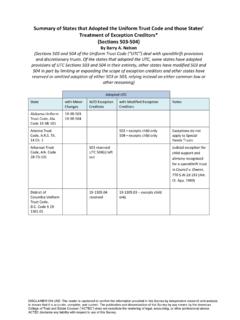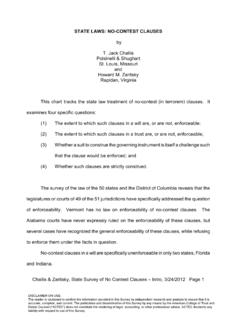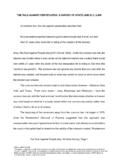Transcription of STATE LAWS: NO-CONTEST CLAUSES - ACTEC
1 STATE laws : NO-CONTEST CLAUSES byT. Jack ChallisPolsinelli & ShughartSt. Louis, MissouriandHoward M. ZaritskyRapidan, VirginiaThis chart tracks the STATE law treatment of NO-CONTEST (in terrorem) CLAUSES . Itexamines four specific questions:(1)The extent to which such CLAUSES in a will are, or are not, enforceable;(2)The extent to which such CLAUSES in a trust are, or are not, enforceable;(3)Whether a suit to construe the governing instrument is itself a challenge suchthat the clause would be enforced; and(4)Whether such CLAUSES are strictly survey of the law of the 50 states and the District of Columbia reveals that thelegislatures or courts of 49 of the 51 jurisdictions have specifically addressed the questionof enforceability. Vermont has no law on enforceability of NO-CONTEST CLAUSES . TheAlabama courts have never expressly ruled on the enforceability of these CLAUSES , butseveral cases have recognized the general enforceability of these CLAUSES , while refusingto enforce them under the facts in CLAUSES in a will are specifically unenforceable in only two states , Floridaand & Zaritsky, STATE Survey of No contest CLAUSES Intro, 3/24/2012 Page 1 DISCLAIMER ON USE: The reader is cautioned to confirm the information provided in this Survey by independent research and analysis to ensure that it is accurate, complete, and current.
2 The publication and dissemination of this Survey by any means by the American College of Trust and Estate Counsel ( ACTEC ) does not constitute the rendering of legal, accounting, or other professional advice. ACTEC disclaims any liability with respect to use of this largest group of states (22) adopt the Uniform Probate Code rule and STATE thatno- contest CLAUSES are enforceable, unless the contest is based on probable cause. Sixteen of these states have adopted Sections 2-517 and/or 3-905 of the Uniform ProbateCode, to this effect. See Alaska, Arizona, Colorado, Hawaii, Idaho, Maine, Massachusetts,Michigan, Minnesota, Montana, Nebraska, New Jersey, New Mexico, North Dakota, SouthCarolina, South Dakota, and Utah. Five more states , Iowa, Kansas, Maryland,Pennsylvania and Wisconsin, have a similar rule, but without using the specific languageof the (14) states , the next largest group, enforce NO-CONTEST CLAUSES withoutregard to probable cause or good faith.
3 See , Kentucky, Louisiana, Missouri, NewHampshire, New York, Ohio, Rhode Island, Virginia, Washington, and Wyoming. Arkansas and Illinois enforce NO-CONTEST CLAUSES unless the contest is based ongood faith. (The law in Illinois is unclear, but one case refused to sustain a no-contestclause noting that the action in question had been brought in good faith.) Connecticut,Iowa, Nevada, North Carolina, Oklahoma, Tennessee, and West Virginia enforce theseclauses unless the contest is based on both good faith and probable cause. Texasenforces these CLAUSES , unless the contest is based on both just cause and good and Mississippi follow the older rule enforcing these CLAUSES if there is a giftover of the forfeited , Delaware, New York, and Oregon have more comprehensive provisionsthat render NO-CONTEST CLAUSES unenforceable with respect to certain types of actions (suchas suits by a fiduciary).
4 Delaware is unique in that it will enforce a NO-CONTEST clause unlessthe contest is & Zaritsky, STATE Survey of No contest CLAUSES Intro, 3/24/2012 Page 2 DISCLAIMER ON USE: The reader is cautioned to confirm the information provided in this Survey by independent research and analysis to ensure that it is accurate, complete, and current. The publication and dissemination of this Survey by any means by the American College of Trust and Estate Counsel ( ACTEC ) does not constitute the rendering of legal, accounting, or other professional advice. ACTEC disclaims any liability with respect to use of this twenty-one states , the rule applied to NO-CONTEST CLAUSES in wills has beenextended to NO-CONTEST CLAUSES contained in trusts. See Florida and Indiana ( CLAUSES areunenforceable in both wills and trusts), and California, Delaware, , Illinois, KansasKentucky, Massachusetts, Michigan, Missouri, Nevada, New Hampshire, New Jersey,Oklahoma, Oregon, Pennsylvania, South Dakota, Texas, Virginia and Wyoming.
5 Casesin Alabama, New York and North Dakota suggest a similar result, but did not enforce theclauses in question because, by their terms, they did not apply to the suit before the court. In no STATE have the legislatures or courts expressly adopted a different rule for wills thanfor trusts. In no STATE has a court or legislature stated expressly that the rule applicableto wills does not apply equally to trusts. Generally, a contest that will trigger a forfeiture under a NO-CONTEST clause requiresan attempt to set aside a will or trust or a provision of a will or trust. A suit to construe theterms of the instrument, to determine whether a particular fiduciary action is consistent withthe governing instrument, or even to determine whether a particular challenge would violatethe NO-CONTEST clause, does not usually result in a forfeiture. See Arkansas, California,Delaware, Georgia, Hawaii, Illinois, Kansas, Kentucky, Massachusetts, Missouri Nevada,New Hampshire, New Jersey, New Mexico (interpreting the UPC), New York, NorthDakota, Ohio, Pennsylvania, Texas, Utah, and Virginia.
6 Michigan, Montana and Oklahomacases that suggest the same CLAUSES are usually construed strictly and narrowly, because they worka forfeiture. See Alabama, California, Georgia, Illinois, Kentucky, Massachusetts, NewJersey, New Mexico, New York, Oklahoma, Pennsylvania, Rhode Island, Tennessee,Texas, Virginia, and West Virginia. A New Mexico case under the UPC takes this position,Challis & Zaritsky, STATE Survey of No contest CLAUSES Intro, 3/24/2012 Page 3 DISCLAIMER ON USE: The reader is cautioned to confirm the information provided in this Survey by independent research and analysis to ensure that it is accurate, complete, and current. The publication and dissemination of this Survey by any means by the American College of Trust and Estate Counsel ( ACTEC ) does not constitute the rendering of legal, accounting, or other professional advice. ACTEC disclaims any liability with respect to use of this may be relevant in other UPC states that have no direct law themselves.
7 A case inMichigan suggests a similar result. New Hampshire, by statute, provides that no-contestclauses are to be expansively construed to fulfill the testator s intentions as expressed inthe & Zaritsky, STATE Survey of No contest CLAUSES Intro, 3/24/2012 Page 4 DISCLAIMER ON USE: The reader is cautioned to confirm the information provided in this Survey by independent research and analysis to ensure that it is accurate, complete, and current. The publication and dissemination of this Survey by any means by the American College of Trust and Estate Counsel ( ACTEC ) does not constitute the rendering of legal, accounting, or other professional advice. ACTEC disclaims any liability with respect to use of this (Wills)Enforceability (Trusts)UPC 2-517 (Intestacy, Wills, and Donative Trans-fers) and 3-905 (Probate of Wills and Ad-ministration). Penalty Clause for ContestA provision in a will purporting to penalize aninterested person for contesting the will orinstituting other proceedings relating to theestate is unenforceable if probable cause existsfor instituting to trustsUTCDoes not address NO-CONTEST e s t.
8 3dProp. No contest ClausesA provision in a donative document purporting torescind a donative transfer to, or a fiduciaryappointment of, any person who institutes aproceeding challenging the validity of all or partof the donative document is enforceable unlessprobable cause existed for instituting the to trusts and (i)R e s t .2dProp. Restraints on ContestAn otherwise effective provision in a will or otherdonative transfer, which is designed to preventthe acquisition or retention of an interest inproperty in the event there is a contest of thevalidity of the document transferring the interestor an attack on a particular provision of thedocument, is valid, unless there was probablecause for making the contest or to trusts and (l) Challis & Zaritsky, STATE Survey of No contest CLAUSES Chart, 3/24/2012 Page 1 DISCLAIMER ON USE: The reader is cautioned to confirm the information provided in this Survey by independent research and analysis to ensure that it is accurate, complete, and current.
9 The publication and dissemination of this Survey by any means by the American College of Trust and Estate Counsel ( ACTEC ) does not constitute the rendering of legal, accounting, or other professional advice. ACTEC disclaims any liability with respect to use of this (Wills)Enforceability (Trusts) 428. Restraints on Will Contests(1) An otherwise effective condition precedent,special limitation, condition subsequent or exec-utory limitation which is designed to prevent theacquisition or retention of a devised interest inand or in things other than land in the event of acontest of the will in which such devise is madeis valid, except as stated in Subsection (2).(2) A provision such as is described in Subsec-tion (1) is invalid to the extent that it applies to acontest of the will based upon a claim of forgeryor upon a claim of subsequent revocation by alater will or codicil, provided there was probablecause for the making of such contestNot addressedBars Suits to ConstrueStrict ConstructionUPCNot coveredYes.
10 See Redman-Tafoyav. Armijo, 126 1200,138 836 ( ) Comment (d)Y e s . C o m m e n t ( d ) . NO-CONTEST CLAUSES areconstrued narrowly, consis-tent with their terms. R e s t . Comment (c)Yes. Comment (b). [T]herestraint should be con-strued as narrowly as pos-sible consistent with itsterms. coveredNot coveredChallis & Zaritsky, STATE Survey of No contest CLAUSES Chart, 3/24/2012 Page 2 DISCLAIMER ON USE: The reader is cautioned to confirm the information provided in this Survey by independent research and analysis to ensure that it is accurate, complete, and current. The publication and dissemination of this Survey by any means by the American College of Trust and Estate Counsel ( ACTEC ) does not constitute the rendering of legal, accounting, or other professional advice. ACTEC disclaims any liability with respect to use of this (Wills)Enforceability (Trusts) Harrison v.









